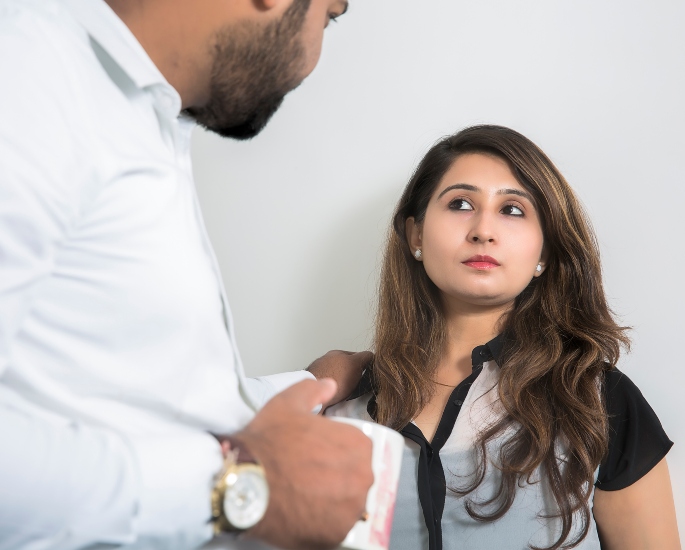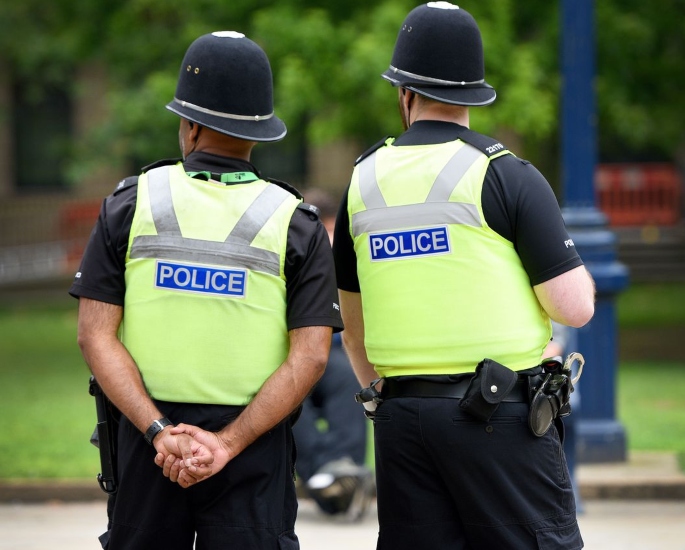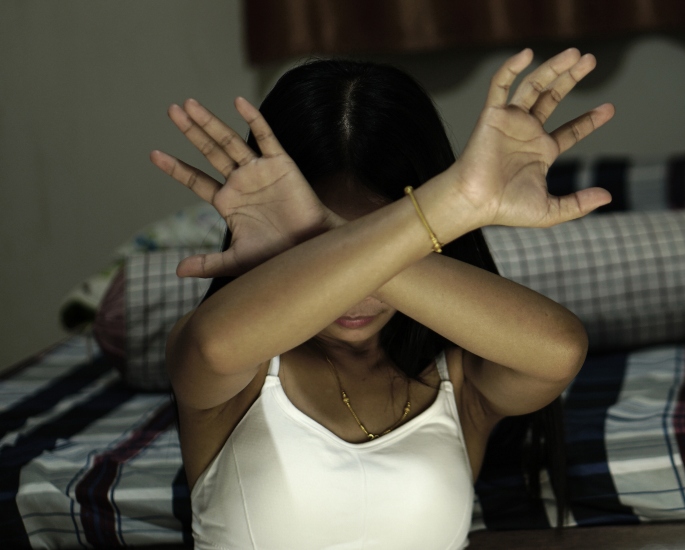"He would not take 'no' for an answer"
Sexual harassment is a very complicated but well-known term within modern vocabulary that has sprung to the forefront of western media.
Many women and feminist groups are paving the way to enable more open conversations surrounding this topic.
Although all genders can encounter sexual harassment, it appears that women are often at the brut of this abuse and are expected to not react to it.
In 2021, an investigation done by the UN Women UK revealed some startling statistics:
“97% of women aged 18-24 have been sexually harassed, with a further 96% not reporting those situations because of the belief that it would not change anything.”
The latter statement in these findings resonates a lot for British Asian women.
Most sexually harassed/abused women stay silent because they know things won’t change and can possibly get worse if they speak.
Although, a rise in movements such as #MeToo succeeded in helping to normalise conversations around sexual harassment.
But unfortunately, for many British South Asian women, a cultural barrier often omits these discussions from actually taking place in their culture.
Cultural Mindset and Patriarchal Norms

Within a culture that is rooted in patriarchal norms and values, it is evident that women’s rights are not at the forefront of the agenda.
Many women are indoctrinated from a young age that they are in their family’s possession and submissive to their male counterparts.
It is vital that they uphold an extremely perfect perception. They have to be honourable, modest and obedient.
There is no room for imperfection, especially when it comes to their personal problems. Avoiding the ‘sharam’ of the community and gaining respect are most important.
However, the strife for ‘perfect perception’ often results in a lack of honesty and justice within households.
In cases of sexual harassment, many women are made to feel as though it is their own fault/problem. They are taught to ignore and disregard it to avoid attention and community gossip.
In 2018, the British Journal of Criminology highlighted that:
“Powerful cultural norms within British South Asian communities, are preventing incidences of sexual harassment and violence from being reported.”
Where many women are raised to be submissive, many men are also raised with a lack of understanding towards respect and equality.
Consequently, men are able to easily objectify women and are incapable of empathy towards their emotions, well-being and freedom.
Aside from this, sex is not very openly discussed in South Asian communities and is often an uncomfortable topic of conversation.
As a result, parents avoid sexual harassment talks with their children.
Therefore, those who have encountered sexual harassment are often unaware and naïve as to what this term may actually constitute.
Certain behaviours are so normalised that even those who have committed an act of sexual harassment may not even see it as wrongdoing.
Sadly, even in cases where it is acknowledged, Desi women still hesitate to speak up and ask for help.
Family ties are very strong within the culture so many women are scared of reporting the incident.
They fear it can cause rifts within the family, as well as the idea of possibly getting someone into trouble.
The consequences of this could result in the victim being further harassed, ostracised by her family, and shamed by the community.
Dr Sruti Varma, a Senior Sociology lecturer at the University of Bradford discussed this further.
She explains how this victim-blaming mentality and gaslighting are huge problems within South Asian culture:
“From young ages, Desi women are taught to be careful in how they may execute themselves. This can vary from anything along the line of clothing to the way in which they speak.
“There is a complete lack of sexual harassment cases being reported amongst South Asian women, as they are often blamed for it happening in the first place.
“They are conditioned to think that they are the reason it happened, thus, evoking a sense of guilt.”
“The women are also gaslit with the fear of losing family support as well as threats of continued harassment if reported.
“In reality, it is the lack of education and control amongst men and their desires, which is never really given any attention.
“Sexual harassment is such a taboo subject within the community, but for things to change, there needs to be an open discussion.
“Education is such a powerful tool and spreading awareness around sexual harassment will be a way to help reduce it.
“Or in the worst case, encourage women to speak out about their harassment and demand the justice that they deserve.
“We should also be calling upon representatives, faith groups and advocates who hold power in these communities to help raise awareness.
“This should grasp the attention of victims as well as potential perpetrators to know what behaviour is/isn’t acceptable.
“Women are entitled to call out this behaviour when it is wrong and should be supported in doing so.
“Most importantly, with more discussion and awareness being raised, victims of sexual harassment will not feel alone and know that there are others going through similar situations.
“The more unity, the easier it really is to break down social constructs and tear apart taboo behaviours towards discussing sexual harassment.”
Dr Sruti Varma’s powerful words directly address how stigmatised sexual harassment and abuse are.
The challenges faced by these British Asian women have not progressed as one may think. Culturally, some still suffer in silence and that needs to change.
Systemic Racism Also a Problem?

In 2017, university lecturers Dr Karen Harrison and Professor Aisha Gill ran a focus group study.
They wanted to gain an insight into sexual harassment within South Asian communities and question why many choose not to speak up.
Through this, a new aspect was discovered. British Asian women hesitate to report incidents given a lack of trust in the UK policing system.
The women expressed their apprehension about reporting under the assumption that there is a cultural barrier. Many felt that the police may not understand their situation.
The visual lack of representation for Black, Asian and ethnic minority workers in the force, as well as women, would further support this argument.
According to Statistica, as of March 2020, only 7.3% of the UK police workforce are officers from an ethnic minority background, with 66.9% being male.
Interestingly, Harrison and Gill’s research notes that the police force did accept that sexual harassment happens within British Asian communities. One officer stated:
“It’s as prevalent as it is with any other community.”
The lecturers cited another officer who said:
“We know it happens. it happens in the family, it happens online, it happens in institutions.”
But despite this, their study showed that the women believed the police didn’t understand the full scale of their culture.
The complications that can arise, the family perceptions or community backlash were something foreign to them. Therefore they feel it’s best to stay hush.
A lack of trust was also emphasised given past policing attitudes and poor motivations towards resolving incidences amongst Black, Asian and ethnic minority groups.
The prevalence of systemic racism within the UK policing system also prevents women from reporting incidents.
There is a tension that it will not be taken seriously, or acted upon in the right manner.
Usma’s* Story

DESIblitz spoke with two women who had experienced sexual harassment on different scales.
The first is Usma, who was set up in an arranged married when she was just 18 years old.
She explained how having a lack of sex education meant that she was often unaware of even her own boundaries:
“My parents never spoke about anything to do with sex and relationships whilst I was growing up.
“I remember entering into the marriage having no prior knowledge of what ‘sex’ even was. This word was almost forbidden in my family.
“When I began to participate in it, everything felt horribly uncomfortable. I would always feel so dirty and violated after.
“I was expected to play the role of an obedient wife and do what my husband was telling me.
“A majority of the time, I had never truly welcomed these sexual acts, but only did so because I was scared of what he would do to me if I didn’t participate.
“Even times when I tried to navigate around it, he would not take no for an answer.
“There were many points within my marriage where things were done to me without consent.”
Usma explained how she was very upset and confused. She wasn’t sure how she was supposed to react in this situation:
“I remember googling this because I was too scared to originally talk to someone.
“I learnt of what sexual harassment/abuse was through online charity pages, and there was a lot of buzz around the #MeToo movement.”
Usma noticed that her feelings were very validated. Her personal space had been violated and she needed to reach out for help.
She decided to confide in her mother but was met with a very unexpected response:
“My mother told me that this is the way that things are, and I should do as I am told.”
“I explicitly remember her telling me to stop making a big deal of it otherwise I will attract attention.
“She told me ‘do you want people to think that you are creating problems in your marriage?’ and that I should be grateful to be in this position!
“It was always what other people were thinking, and never about my own safety and wellbeing.
“I felt as though I was the problem. It took me a very long time, and with support from a local group, to realise that it wasn’t me.”
Usma’s unfortunate experiences are the norm for some women who have to live through that torture every day.
Luckily Usma found resources online but at times, others don’t have that luxury. Her story also makes an important point relating back to education and conversation.
Without valuable acceptance from South Asian communities that sex education is normal, children aren’t being taught between right and wrong, normal and irregular.
Alisha’s* Story

Alisha’s story is also powerful due to the location of her torment. She explains how she encountered sexual harassment in the workplace.
“Being an engineer, I work in a very male-dominated industry. A lot of these men have very big egos.
“I have experienced quite a lot of verbal and physical sexual harassment.
Alisha detailed how she had men inappropriately touching her and also commented on the way that she dresses:
“This made it very uncomfortable for me to enjoy my job and working environment.
“I should be able to hone my femininity alongside being taken seriously as a professional.
“I decided to confide in some family members for advice on how to address this situation. Instead, I was made to feel as though I was the problem.
“They would tell me that I dressed too explicitly so no wonder my male colleagues could not control themselves.
Alisha shared how even her aunty had made comments:
“My aunty said I need to think about how I ‘propose myself to my community’.
“She said to me ‘are people going to respect you when you dress like that and wear so much makeup?’
“I was upset to have this reaction from my family. I then also experienced issues submitting some of the comments to HR.
“My company’s HR department was not very well established. I hit many walls trying to report incidences in the workplace.
“I was belittled, laughed at, and gaslighted to the point that I couldn’t even remember what I was complaining about.”
“As an Asian woman, I feel that we struggle for support in many areas when it comes to these things.
“It’s hard for women in general, but with cultural barriers, it makes the conversation around sexual harassment even more difficult.
“We are expected to be silenced and compliant with what we are told, and how we depict ourselves. This really needs to change.”
Harassment in the workplace is one of the most common forms of sexual abuse. The alarming nature of this stems from the abuse of power, particularly with men in higher positions.
This happens to women of all races but British Asian women have a more difficult time navigating past these events.
Is There Help out There?

There are many charities and organisations that have services out there to help support those who have encountered sexual harassment in any form.
However, in more isolated communities where the local population is less diverse, there has been some difficulty using these services.
Dr Karen Harrison further stated in her study that when survivors manage to open up about their experiences:
“Both support services and social frameworks for understanding sexual abuse/harassment often prove insensitive to cultural factors.”
There have been major improvements on this, and organisations are actively recruiting from various backgrounds to ensure that they can effectively support their beneficiaries.
It is evident that for this problem to truly cease, education and raising awareness should be a priority.
It is the role of responsible and influential individuals/groups within South Asian communities to ignite this movement.
Desi women deserve the right to know when something is wrong, and to know when to speak up about it.
Furthermore, they shouldn’t feel hesitant or hopeless that they will never see light at the end of the tunnel.
If you or someone you know is currently experiencing a form of sexual harassment/abuse please reach out:
- Roshni – 0800 953 9777
- Karma Nirvana – 0800 5999 247
- Support Line – 01708 765200






























































